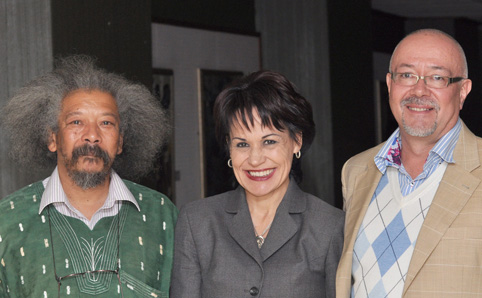Latest News Archive
Please select Category, Year, and then Month to display items
14 June 2024
|
Story Anthony Mthembu
|
Photo Suplied
 Jeremiah Hlahla, a UFS student completing his PhD in Botany at the University of Debrecen as part of an exchange initiative funded by the Erasmus+ Mobility Programme.
Jeremiah Hlahla, a UFS student completing his PhD in Botany at the University of Debrecen as part of an exchange initiative funded by the Erasmus+ Mobility Programme.
As part of an exchange initiative facilitated by the Erasmus+ Mobility Programme, Jeremiah Hlahla, a student at the University of the Free State (UFS), is nearing the completion of his PhD studies at the University of Debrecen in Hungary. Hlahla’s journey, which began in February 2024 and is set to conclude in July 2024, has been a remarkable learning opportunity. “As a first time-traveller to Europe, I have thoroughly enjoyed engaging with people from different countries and cultures,” he said.
The benefits of international collaboration
Hlahla is currently pursuing a PhD in Botany, focusing on plant stress physiology. “My current PhD project investigates the physiological, biochemical and morphological responses of vegetable-type soybean, or edamame, to combined drought and heat stress,’’ he explained. He considers the University of Debrecen the ideal institution to complete his research due to its extensive expertise and resources in similar projects. He noted that his colleagues at Debrecen conduct significant work on plant protection against biotic and abiotic stresses, including salt and drought stress, as well as proteins and amino acids in barley and other legumes.
Given the vast knowledge available on similar projects, Hlahla has found substantial engagement with his work at the University of Debrecen. “Upon arrival, I delivered an introductory lecture presenting my UFS project on the synergistic effects of combined drought and heat stress on the physiology and biochemistry of edamame. It was an engaging session as everyone could relate to my work and asked many questions,’’ he said.
Insights gained from the exchange
Hlahla has also gained valuable lessons that will assist him in his research career, including biotechnology and physiology tools. “I learned how to prepare samples and use high-performance liquid chromatography (HPLC) and reversed-phase ultra-high-performance liquid chromatography (UHPLC) to quantify proteins and amino acids,’’ he said. These techniques are beneficial not only for his current work but will also support future soybean research.
As his experience at the University of Debrecen nears its end, Hlahla reflects on the collaborations and friendships he has formed, which stand out as a significant highlight.
UFS outlines research achievements
2011-09-02
|

|
|
At the launch of the 2010 Annual Research Report, were from the left: Mr Robert Kriger, the director for Policy and Strategy at the National Research Foundation (NRF); Prof. Driekie Hay, Vice-Rector: Academic and Prof. Frans Swanepoel, Senior Director: Research Development.
Photo: Stephen Collett
|
The University of the Free State (UFS) is well on course for delivery on its most important academic duty as a research university. This was the message that came forward at the launch of the 2010 Annual Research Report of the UFS on 30 August 2011.
Speakers at the launch, which included Prof. Jonathan Jansen, Vice-Chancellor and Rector, as well as Prof. Driekie Hay, Vice-Rector: Academics outlined the key strategies and achievements of the UFS for the 2010 academic year. This included the establishment of a Postgraduate School at the UFS, the first of its kind at a public university in South Africa. Prof. Hay told guests that the aim of the Postgraduate School was to broaden research and deepens scholarship on postgraduate education in the country. She highlighted some initiatives the UFS undertook in 2010 to build and maintain its intellectual capital. Some of these initiatives included the appointment of seven senior professors and recruiting more female and black scholars and academics.
Also speaking at the event was Mr Robert Kriger, the director for Policy and Strategy at the National Research Foundation (NRF). Kriger reflected on the brilliant minds of scholars such as Archie Mafeje, Lewis Nkosi and Dennis Brutus and argued for efforts to increase the country’s research output.
Some highlights of the 2010 Annual Research Report:
- The total funding available for research at the UFS increased from approximately R199 million in 2009 to just over R210 million in 2010. A total of R31.8 million was made available from central university funds.
- In 2010 the UFS was home to 92 NRF-rated researchers. During 2010, four researchers applied for re-evaluation and of these, two improved their rating, while a further five received a first-time rating.
- The Faculty of Natural and Agricultural Sciences continue to be the most prolific producer of publications in accredited journals, while the Faculty of Education has shown a 54% increase in its publication output.
- Staff members in the Physics department at the UFS Qwaqwa Campus published 22 papers in international peer-reviewed journals during 2010.
- Also at the Qwaqwa Campus: Ms Khethiwe Mtshali,a postgraduate student in the parasitology research unit of the Department of Zoology and Entomology, received a best Honours presenter award at the 1st Annual Research symposium of the National Zoological Gardens of South Africa.